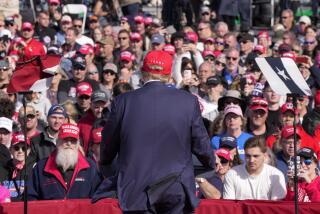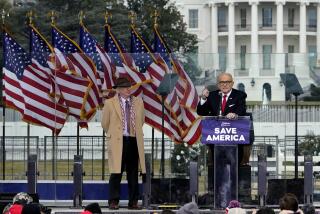White House Sees Most as Firm in Disbelief of Reagan
WASHINGTON — On the eve of congressional hearings into the Iran- contra scandal, the White House sees no immediate prospect of convincing the public that President Reagan was not more deeply involved in the affair than he has admitted.
Reagan has repeatedly denied that he had any knowledge that funds from the sale of arms to Iran were diverted to Nicaraguan rebels.
But just as consistently, public opinion polls have shown that most Americans do not believe him. An ABC-Washington Post poll released April 14 found that 65% of those surveyed doubted he had told the truth about the scandal.
‘Will Always Be Skepticism’
“We don’t expect the public’s attitude toward the President to change,” White House spokesman Marlin Fitzwater said during a luncheon session with reporters. “There’ll always be skepticism about Iran-contra.”
Since Howard H. Baker Jr. became White House chief of staff in February and reorganized the staff, Fitzwater said, no staff members remain who were involved in the Iran-contra affair. Therefore, he said, the White House has “no fear or sense of urgency” about the congressional hearings, which begin Tuesday, or the criminal investigation of the scandal by independent counsel Lawrence E. Walsh.
Fitzwater indicated that the White House, hoping to keep from contributing to publicity about the Iran-contra affair, intends to refuse to comment on developments at the hearings. The White House posture, he said, will be that it is up to Congress to “sort out the facts” that are developed during the hearings.
Beyond that, Fitzwater said, the White House intends to divert attention from the hearings by taking “an aggressive public posture” on such issues as trade, arms control, the federal budget and the Strategic Defense Initiative.
Several publications have quoted unnamed sources as saying that Rear Adm. John M. Poindexter, Reagan’s former national security adviser, is prepared to testify that the President knew of the diversion of funds to the contras, which occurred during a period when Congress had banned U.S. military aid for the guerrillas.
‘Said He Didn’t Know’
But Fitzwater said: “We all assume the hearings won’t have a direct impact on the President. The President said he didn’t know and we assume he didn’t.”
Fitzwater, who replaced Larry Speakes as Reagan’s chief spokesman on Feb. 1, said he thought the press had done “a pretty good job” of covering the Iran-contra affair. With rare exceptions, he said, the press has treated the President and the Administration fairly.
On other subjects, Fitzwater said that circumstances have complicated the Administration’s search for successors to FBI Director William H. Webster, who has been nominated to head the CIA, and Chairman John S. R. Shad of the Securities and Exchange Commission, who has been nominated to be ambassador to the Netherlands.
Even though many qualified candidates are under consideration, he said, the White House still has “a long way to go” before deciding on successors.
The FBI post involves a political problem because “we waited too long to name a successor and now everybody in town has a candidate and the Justice Department feels strongly about a number of candidates,” Fitzwater said.
For the SEC, he said, the insider-trading scandal on Wall Street has led the White House to look for someone “who is strong on the financial side but also can deal with criminality.”
More to Read
Get the L.A. Times Politics newsletter
Deeply reported insights into legislation, politics and policy from Sacramento, Washington and beyond. In your inbox three times per week.
You may occasionally receive promotional content from the Los Angeles Times.










